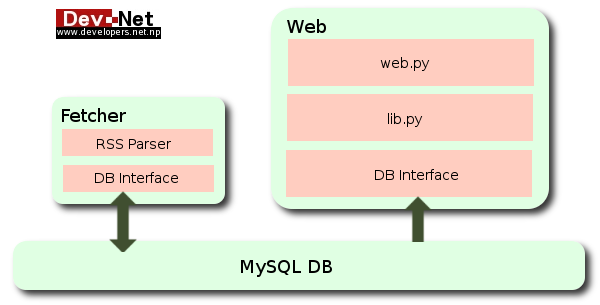DevNet: A web-based RSS aggregator developed in Python
| Category: | Software Development, |
|---|---|
| Keywords: | Web2.0, |
| Title: | DevNet: A web-based RSS aggregator developed in Python |
| Author: | Aadish Shrestha |
| Date: | 2005-01-05 |
| Summary: | DevNet is a web based RSS aggregator developed in Python using the Quixote web development framework. |
| Logo: | 
|
Introduction
DevNet provides a convenient way to keep up with changes on IT related news sites, without re-visiting those sites manually to look for new articles. It acts as a gateway to multiple news sites, organizes news by topic, and keeps track of which articles have already been seen by a given user.
DevNet works by watching news feeds based on Really Simple Syndication (RSS), a popular standard for syndicating web-based news. RSS packages news articles as XML documents to facilitate their transfer from site to site. DevNet acts as a web-based RSS aggregator by fetching RSS feeds from selected websites every 2 hours and updating its database with any new items published since the last fetch from each site.
Users can select feeds of interest from the collection of all feeds and organize these on a customized page called My Feeds. These are remembered using cookies so registration is not required. On later visits, a user can go directly to My Feeds and get a listing of items published in various sites (feeds) he has subscribed to. The customized page will also display the number of new items in each site (feed) since the user's last visit.
Architecture
DevNet can be divided into 2 modules: (1) the RSS fetcher, and (2) the web application.
The RSS fetcher is responsible for retrieving RSS feeds from selected sites at specified time intervals. It is written in Python and uses Mark Pilgrim's Universal Feed Parser to parse RSS feeds, and MySQLdb to store each parsed RSS document into a MySQL database. The fetcher is multi-threaded and is scheduled by cron to run every 2 hours.

The web application is responsible for interacting with the user and presenting them with the previously fetched RSS documents according to their interest and time of previous visit. This part of DevNet was written using the Quixote web development framework and simpleTAL for generating HTML from templates. It is a 3-tiered application, with application logic implemented in lib.py and the user interface in web.py. The code in web.py uses simpleTAL templates to generate HTML. These templates are compiled to HTML on the first request received and then cached. On consecutive requests the cached HTML pages are served until the cache expires, at which time the templates are recompiled.
The DevNet web application runs as a cgi script on a Linux server using Apache. However, the Quixote web application framework is not Apache-specific, so other other web servers capable of executing CGI scripts can also be used. In fact, the development of DevNet was done using Medusa.
Why Python?
The author had two reasons to undertake this project:
- To save time keeping up with IT related news.
- To learn Python.
DevNet is a fairly simple application, so it was appropriate as a first project while learning Python. The first prototype version of DevNet used Quixote's PTL for templating and had no database. Python made development of this prototype very rapid, despite the author's initial unfamiliarity with the language.
After this was completed, the rapid development nature of Python made it easy to throw away the prototype and rewrite DevNET, again quite quickly, using the architecture described above.
Conclusion
Learning Python and writing DevNet at the same time was an enjoyable experience. With Python, application development is fast and the learning curve is easy to manage.
About the Author
Aadish Shrestha is currently pursuing a Masters in Venture Technology Management at Hoseo University, South Korea. He worked previously as lead systems administrator at an ISP in his home country of Nepal, and has a degree in Computer Science and Engineering from Kathmandu University, Nepal.

